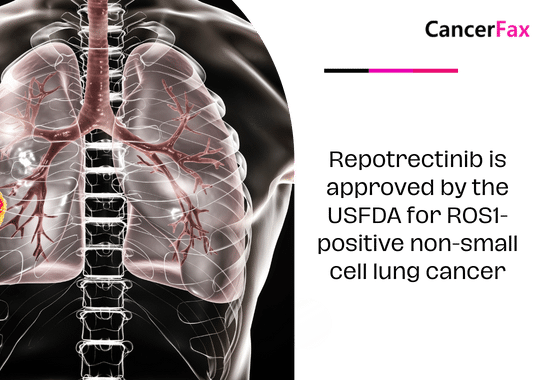The Food and Drug Administration authorized repotrectinib (Augtyro, Bristol-Myers Squibb Company) for locally advanced or metastatic ROS1-positive non-small cell lung cancer (NSCLC) on November 15, 2023.
This FDA approval is the first to encompass patients with ROS1-positive NSCLC who have previously been treated with a ROS1 tyrosine kinase inhibitor (TKI), as well as individuals who have not had TKI treatment before.
The approval was granted following the TRIDENT-1 clinical trial (NCT03093116), a global study including many centers, with a single-arm, open-label design, and various patient cohorts with ROS1-positive locally progressed or metastatic NSCLC. The effectiveness was assessed in 71 ROS1 TKI-naïve patients who had undergone a maximum of 1 previous line of platinum-based chemotherapy and/or immunotherapy, and in 56 patients who had received 1 previous ROS1 TKI without prior platinum-based chemotherapy or immunotherapy.
The primary efficacy measures were the overall response rate (ORR) and duration of response (DOR) based on RECIST v1.1 as evaluated by an impartial central review. Confirmed Objective Response Rate (ORR) was 79% (95% CI: 68, 88) in the group of patients who had not had treatment with a ROS1 TKI before, and 38% (95% CI: 25, 52) in patients who had received prior treatment with a ROS1 inhibitor. The median duration of response was 34.1 months (95% CI: 25.6, not evaluable) and 14.8 months (95% CI: 7.6, not evaluable) in the two groups, respectively. Observations were made in cerebral lesions of patients with quantifiable central nervous system metastases, as well as in individuals with resistance mutations after tyrosine kinase inhibitor therapy.
The most frequent adverse responses, occurring in over 20% of cases, were dizziness, dysgeusia, peripheral neuropathy, constipation, dyspnea, ataxia, exhaustion, cognitive problems, and muscular weakness.
The suggested repotrectinib dosage is 160 mg taken orally once a day, with or without meals, for 14 days. Afterward, the dosage should be increased to 160 mg taken twice a day until disease progression or intolerable toxicity.

Targeting FGFR4 and CD276 with CAR T-cells demonstrates a strong antitumor impact against children rhabdomyosarcoma
Chimeric antigen receptor (CAR) T-cells that specifically target Fibroblast Growth Factor Receptor 4 (FGFR4), a surface tyrosine receptor that is extensively expressed in rhabdomyosarcoma (RMS), are now undergoing clinical research. However, the effectiveness of these CAR T-cells may be hindered by tumor heterogeneity and inadequate activation. In this study, we present a method to enhance the co-stimulatory and targeting characteristics of a FGFR4 CAR through an optimization process. We substituted the hinge and transmembrane domain of CD8 as well as the 4-1BB co-stimulatory domain with the corresponding domains of CD28. The CARs produced exhibit heightened anti-tumor efficacy in multiple RMS xenograft models, with the exception of the RMS559 cell line, which is known for its aggressive nature.

